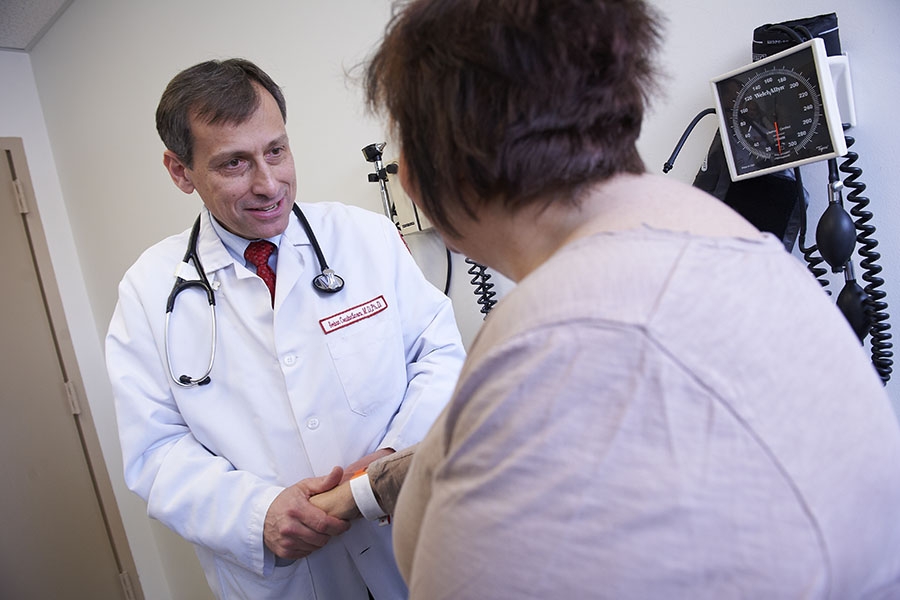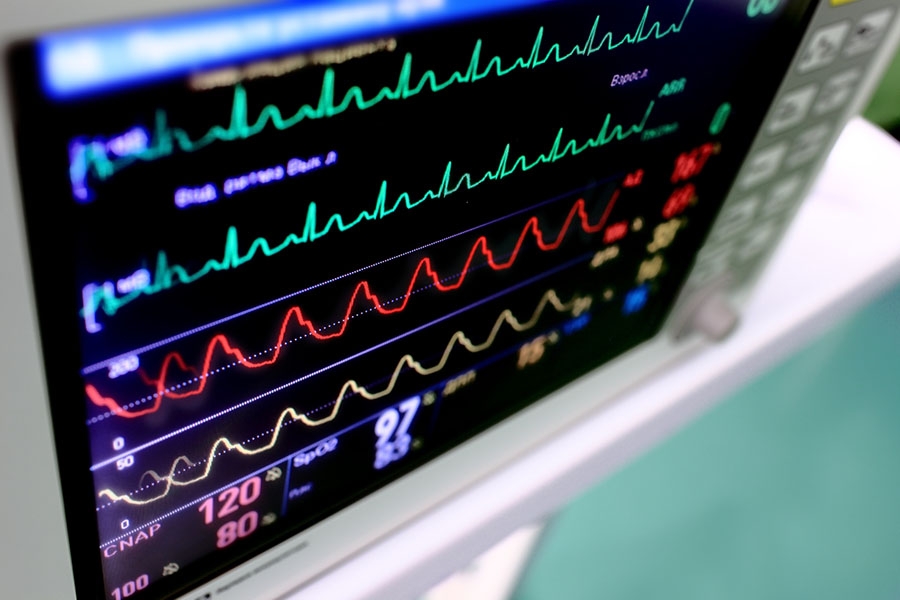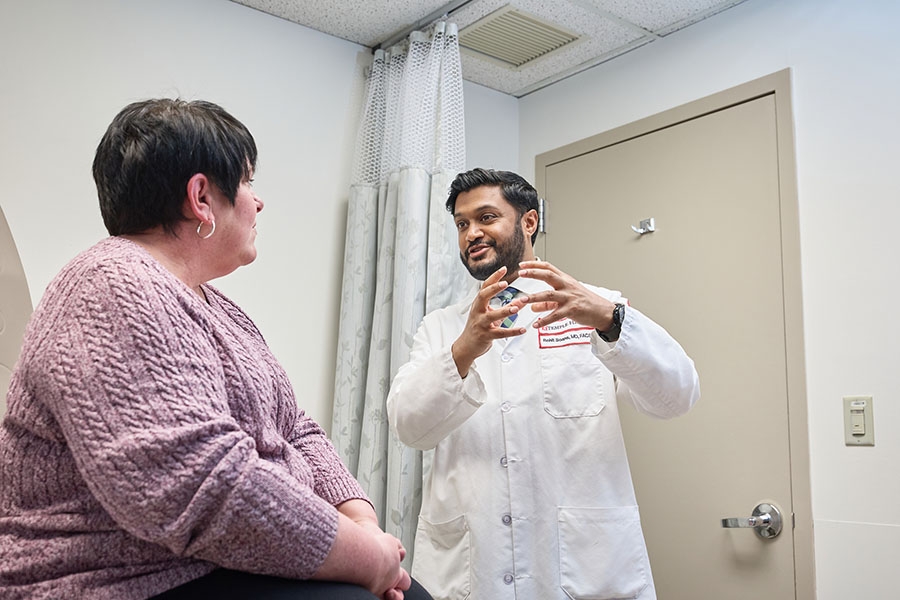The COVID-19 vaccine means hope that there are brighter days ahead. I’m an infectious disease specialist at Temple, so I get asked a lot of questions about the two authorized vaccines, including what side effects they may cause.
Here, I answer some those common questions, so that you have the information you need to keep you and your loved ones healthy and protected.
Jump to:
- A few severe allergic reactions were reported. Should I be worried?
- Are there other side effects?
- Do any other allergies or conditions, like Bell’s palsy, pose a risk?
- If I’ve already had COVID-19 and recovered, should I still get the vaccine?
- How long should I wait after I’ve recovered from COVID-19 to get the vaccine?
- There have been reports of people getting vaccinated and then later coming down with COVID-19. Does that mean these vaccines aren’t as effective?
- If I happen to come down with COVID, should I wait to get the second dose?
- What about the news that the virus has mutated? Will these vaccines still be effective?
- Once I’m vaccinated, can I finally stop wearing a mask everywhere?
- Is there a microchip in the vaccine?
In the early days of the vaccine rollout, a few severe allergic reactions were reported. Should I be worried?
We have not seen anything like that at Temple. But some vaccines — not just these COVID-19 vaccines — do cause a very small number of people to have bad allergic reactions, also called anaphylaxis. For that reason, we have people stay around for 10 to 15 minutes after they receive their shot. That way, if anyone has a reaction, we will be right there to care for them.
If you have had allergic reactions in the past because of a different injection or vaccine, talk to your doctor before getting the COVID-19 vaccine.
Are there other side effects?
Both vaccines may cause similar side effects. People who do experience side effects report irritation and arm soreness at the injection site as the most common.
Other side effects happen less often like headache, muscle aches, fatigue, joint pain and a slight fever. Those effects are a little more common after the second dose.
While these symptoms may be a bit uncomfortable, they’re proof that the first dose activated your body’s immune response. Put simply, the vaccine is doing its job.
If you experience any of these symptoms, you can take ibuprofen (Advil, Motrin) or acetaminophen (Tylenol). But do not take any pain relievers BEFORE you get the shot.
Do any other allergies or conditions, like Bell’s palsy, pose a risk?
The COVID vaccines do not use a living virus, preservatives, penicillin or eggs. That means that if you’ve had a reaction to another vaccine in the past because of those ingredients, you do not have to worry about having a bad reaction to the COVID vaccine.
Experts believe both authorized COVID-19 vaccines are also safe for pregnant people and people who are immunocompromised (for example, if you’re having cancer treatment).
If you’ve had Bell’s palsy, that will not prevent you from getting this vaccine, either. At this point, the only reason NOT to get the COVID vaccine is a history of severe allergic reactions to vaccines or injectable medications. We encourage everyone who might be concerned to talk to their doctor.
If I’ve already had COVID-19 and recovered, should I still get the vaccine?
Yes. There are still many unanswered questions about COVID-19, including how long someone is protected from getting sick again after recovering from it. For this reason, it’s best for everyone to get vaccinated.
How long should I wait after I’ve recovered from COVID-19 to get the vaccine?
We think most people who have had COVID-19 get antibodies that protect them from getting sick again for 60 to 90 days. And we think that the reinfection risk — the potential that you could catch it again during that 90-day window — is very low.
That said, if you currently have no symptoms and you’re at least 14 days past your positive test, get the vaccine as soon as you can. Getting the vaccine while you still have those antibodies will not impact the vaccine’s effectiveness.
There have been reports of people getting vaccinated and then a week or so later, coming down with COVID-19. Does that mean these vaccines aren’t as effective as we thought?
No. Most likely, it means that those people were exposed to the virus just before they were vaccinated or in the first few days after getting their first dose, before the vaccine had a chance to work.
Remember, the vaccine does not make you immune right away. It can take 1 to 2 weeks for your body to develop immunity. And the second dose of the vaccine is very important to get so that you have the most effective protection.
If I happen to come down with COVID, should I wait to get the second dose?
Wait until you’re 14 days past your positive test and your symptoms have gone away. As much as possible, you should still try to get your second dose as close to the recommended time as you can:
- Pfizer vaccine: 21 days after the first dose
- Moderna vaccine: 28 days after the first dose
What about the news that the virus has mutated? Will these vaccines still be effective?
“Mutation” can sound scary, but viruses mutate all the time. The mutations you have heard about do seem to make the virus more easily spread. But the symptoms of the virus are not any worse.
Research is ongoing, but early evidence shows that both of the authorized vaccines, along with those still being developed, will be just as effective against COVID-19 mutations.
Once I’m vaccinated, can I finally stop wearing a mask everywhere?
No. Both the Moderna and Pfizer vaccines are very effective at preventing people from getting COVID-19. But a person who does not get sick can still be infected with the virus.
Researchers do not know yet whether a vaccinated person can or cannot spread the virus to others. Until they do, it’s important that we continue to wear masks, wash our hands often and keep a safe distance from others. The end of all this is finally in sight, but we’re not there quite yet.
Is there a microchip in the vaccine?
That claim is false. There is no microchip or tracking device in the vaccine. The only ingredients in the vaccine are those that will help prevent you from getting COVID-19.
The vaccine has a chip on the outside of the vial so that doses are tracked to the location where they are distributed. The chip does not go inside the vaccine and does not go inside your body.
Helpful Resources
Looking for more information?


